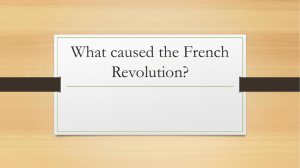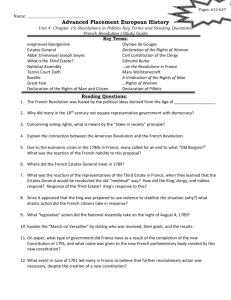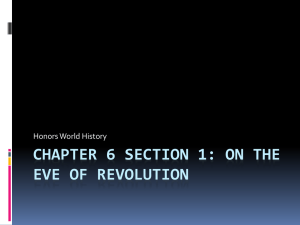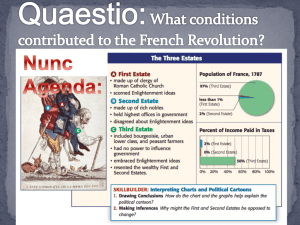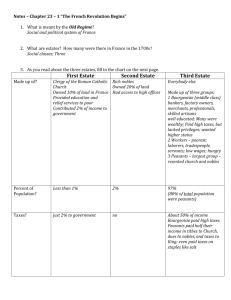French Revolution -
advertisement
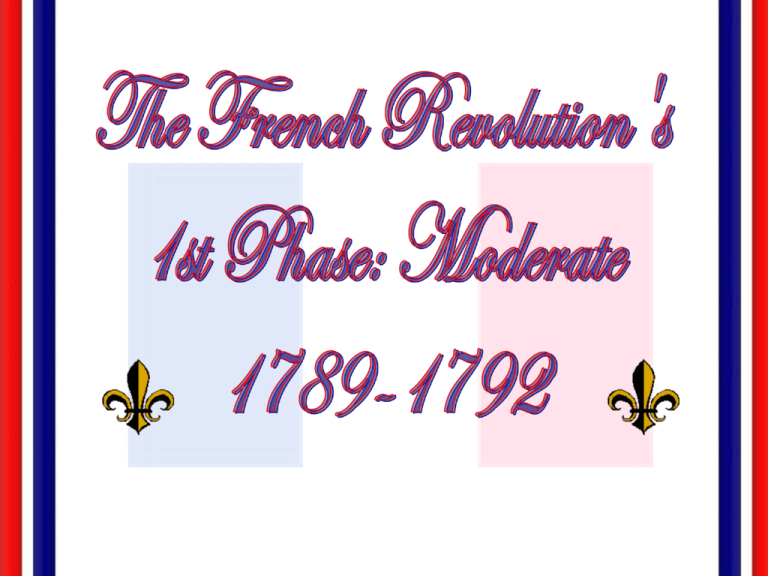
King Versus Assembly of Notables • Archaic banking system and a lack of paper money limited economic options – Can’t inflate currency – French gov. owes money to too many powerful people to simply default • Thus, Louis XVI asks nobles to give up tax privileges • Nobles respond, sure, if… – …we get more say in how the money is spent (checks and balances) In Desperation, Louis Calls the Estates General May, 1789 Last time it was called into session was 1614! [why?] Representatives to the Estates General Represent Almost All of The Groups We Have Discussed •Wealthy and poor nobles •Sword and robe •Rich and poor clergy •Bourgeois •BUT no urban/rural poor •These last two groups will still find ways to be heard… you’ll see Cahiers The Voting Deadlock The Old Pattern: Voting by Estates 1 1 Clergy 1st Estate Aristocracy 2nd Estate 1 Commoners 3rd Estate Louis XIV insisted that the ancient distinction of the three orders be conserved in its entirety. 3rd Estate’s Suggestion Vote by Head! 300 Clergy 1st Estate Aristocracy 2nd Estate 300 648 Commoners 3rd Estate Why did this cause a deadlock? Emmanuel Joseph Sieyes 1st What is the Third Estate? Everything! 2nd What has it been heretofore in the political order? Nothing! 3rd What does it demand? To become something therein! Abbé Sieyès 1748-1836 “The Third Estate Awakens” Y the Third Estate storms out of the Estates General and begins to meet separately as a “National Assembly” Y What is the point of their new name? “The Tennis Court Oath” by Jacques Louis David June 20, 1789 Louis XVI’s Crafty Response to Tennis Court Oath? Yes, yes… please do write that Consitution! Bird? What bird? Soldiers…come, now! National Assembly is Saved By…? • The ‘mob’– urban workers in Paris Storming the Bastille, July 14, 1789 Y Urban peasants feared that the king was planning a military coup against the National Assembly. Y Attack the Bastille prison, looking for gunpowder Y 18 died. Y 73 wounded. Y 7 guards killed. Y It held 7 prisoners [5 ordinary criminals & 2 madmen]. Y Becomes THE symbol of the Revolution Victorious Mob After Storming of the Bastille The Great Fear: Peasant Revolt (July 20, 1789) Y Rumors that the feudal aristocracy were sending hired brigands to attack peasants and pillage their land. August Decrees August 4-11, 1789 (A renunciation of aristocratic privileges!) Liberté! Egalité! Fraternité! Night Session of August 4, 1789 Y Before the night was over: The feudal regime in France had been abolished. All Frenchmen were, at least in principle, subject to the same laws and the same taxes and eligible for the same offices. Equality & Meritocracy! BUT . . . . . Y Feudal dues were not renounced outright [this had been too strong a threat to the principle of private property!] Y Peasants would compensate their landlords through a series of direct payments for obligations from which they had supposedly been freed. Therefore, the National Assembly made revolutionary gestures, but remained essentially moderate. Also, in a sense, the 2nd nobles gave up what they had already lost… Their Goal Safeguard the right of private property!! Nonetheless, the Peasants Did Get Their Hands on A Significant Amount of Land • One of the longest lasting and most important successes of the Revolution • To this day, land in France is owned by a surprisingly large number of small landholders The Declaration of the Rights of Man and of the Citizen August 26, 1789 V Liberty! V Property! V Resistance to oppression! V Natural Rights V Thomas Jefferson was in Paris at this time. The French Constitution Took Much Longer to Write • Why? – Declaration versus Constitution • In the meantime, the situation had not improved much for the urban poor. They became tired of waiting… • Women’s March on Versailles March of the Women, October 5-6, 1789 A spontaneous demonstration of Parisian women for bread. We want the baker, the baker’s wife and the baker’s boy! Only the Intervention of _______ Saved the King and Queen’s Life The king was thought to be surrounded by evil advisors at Versailles so he was forced to move to Paris and reside at the Tuileries Palace under ‘palace arrest’ Louis XVI ‘Accepts’ the Constitution & the National Assembly. 1791 Why do I have accepts in quotes? The French Constitution of 1791: Liberalism V capitalism V Religious toleration V Rationalism V Church Under State Control V No guilds, monopolies, unions, etc. The French Constitution of 1791: A Constitutional Monarchy The king got the “suspensive” veto [which prevented the passage of laws for 4 years]. V V A permanent, elected, single chamber National Assembly. V He could not pass laws. His ministers were responsible for their own actions. The king did still run the military and foreign policy Had the power to grant taxation. An independent judiciary. The French Constitution of 1791: A Bourgeois Government V “Active” Citizen [who pays taxes amounting to 3 days labor] could vote V “Passive” Citizen. 1/3 of adult males were denied the franchise. Domestic servants were also excluded. How to Finance the New Govt.? Confiscate Church Lands (1790) One of the most controversial decisions of the entire revolutionary period. Print Assignats V V Issued by the National Constituent Assembly. Interest-bearing notes which had the church lands as security. The Civil Constitution of the Clergy The oath of allegiance permanently divided the Catholic population! New Relations Between Church & State V Government paid the salaries of the French clergy and maintained the churches. V The church was reorganized: Parish priests elected by the district assemblies. Bishops named by the department assemblies. The pope had NO voice in the appointment of the French clergy. V It transformed France’s Roman Catholic Church into a branch of the state!! Pope Pius VI [1775-1799] The Cascade Effect • Revolutions often become a series of revolutions – Why? – Divergent groups agree on what they don’t like, but then argue about what to replace it with • In this first phase, the Church serves as the sticking point – Rural peasants versus bourgeois – Reason versus faith -For the liberal bourgeois and the most liberal nobles, the revolution is over - However, many groups remained unsatisfied -- rural peasants- bring religion back -- urban workers- we don’t have land– we want more radical changes– gov should provide food and work -- king- I have been humiliated!
